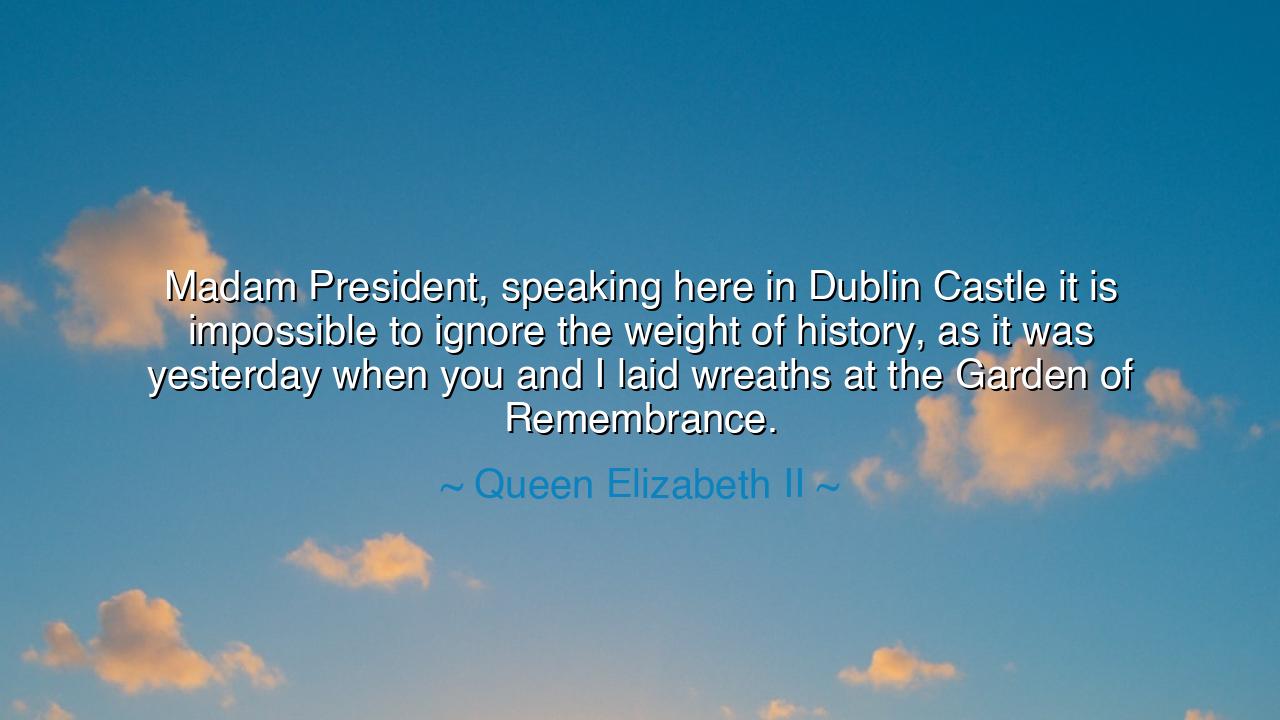
Madam President, speaking here in Dublin Castle it is impossible
Madam President, speaking here in Dublin Castle it is impossible to ignore the weight of history, as it was yesterday when you and I laid wreaths at the Garden of Remembrance.






“Madam President, speaking here in Dublin Castle it is impossible to ignore the weight of history, as it was yesterday when you and I laid wreaths at the Garden of Remembrance.” – Queen Elizabeth II
In these solemn and graceful words, Queen Elizabeth II spoke not merely as a monarch, but as a witness to the long, turbulent journey of two nations — Britain and Ireland — whose histories are woven together with threads of sorrow, pride, and endurance. Her words, spoken in Dublin Castle during her historic visit to Ireland in 2011, carry the profound weight of centuries. They are a recognition that the past is never truly gone; it lingers, shaping the present, demanding acknowledgment, and inviting reconciliation. When the Queen spoke of the “weight of history,” she spoke of the invisible presence that fills the air between nations, between generations — the echo of conflict and the quiet longing for peace.
To stand in Dublin Castle was itself symbolic. For centuries, it had been the seat of British power in Ireland, a place where authority was imposed and sovereignty denied. To speak there as a guest, addressing the President of Ireland, was an act of humility and healing. The Queen’s words were carefully chosen, yet they throbbed with emotion beneath their composure. She understood that peace cannot be decreed; it must be earned through remembrance. And so she looked backward not to reopen wounds, but to honor them. By recalling the laying of wreaths at the Garden of Remembrance, she invoked a sacred act — one of mutual respect, where two leaders paused not as ruler and subject, but as human beings mourning together the losses of history.
The Garden of Remembrance itself is a place consecrated to those who gave their lives for Ireland’s freedom — those who fought against the very empire the Queen represented. Her gesture in laying a wreath there was nothing short of historic. It was not an apology, but something deeper: an acknowledgment of shared pain. It was an offering of grace, a silent bow before the dignity of a people long wronged. And in that silence, the world heard something louder than words — the sound of centuries softening.
The origin of this moment lies in the long arc of reconciliation between Britain and Ireland, an arc bent by courage and compassion. After years of division, bloodshed, and mistrust — from colonial subjugation to the wars of independence, from the partition to the Troubles — this meeting in Dublin symbolized a turning of the page. It was a reminder that history, though heavy, need not chain the future. By invoking the “weight of history,” the Queen did not deny its burden; she embraced it, showing that remembrance is not weakness, but wisdom.
This moment finds kinship with other great acts of historical reckoning. Think of Nelson Mandela, who after his release from prison, invited his former jailers to his inauguration — not to erase the memory of apartheid, but to transform memory into forgiveness. Or of Charles de Gaulle and Konrad Adenauer, who clasped hands in the ruins of postwar Europe, binding France and Germany in friendship after centuries of rivalry. Such gestures, like the Queen’s in Dublin, remind us that true leadership is not measured by conquest, but by the courage to reconcile. It is easy to build walls; it takes a soul of strength to build bridges across the scars of time.
The lesson in the Queen’s words is this: we must not flee from history, nor be enslaved by it. The past, however painful, is our teacher — it humbles us, warns us, and guides us toward wisdom. To ignore it is to repeat it; to confront it is to transcend it. When she spoke of the “weight of history,” she was also speaking to every generation that inherits old wounds — urging them to remember with dignity and act with grace. For only when memory and mercy walk together can peace take root.
So, dear listener, take this wisdom into your heart. When you stand amid the ruins of old resentments — whether between nations, families, or within your own soul — do not avert your eyes. Look upon them as the Queen did in Dublin Castle: with humility, compassion, and courage. Lay your own wreath of remembrance, not to dwell in grief, but to honor what was and to bless what may yet be. For reconciliation begins not in grand speeches or treaties, but in the quiet act of acknowledgment — the willingness to face the truth of history and still choose the path of peace.
And thus, from that moment in Dublin Castle, we are reminded that the weight of history, though heavy, can also be the foundation of harmony, if only we have the heart to bear it together.






AAdministratorAdministrator
Welcome, honored guests. Please leave a comment, we will respond soon